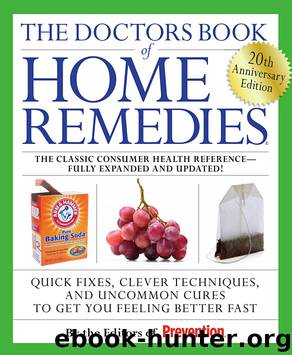The Doctors Book of Home Remedies by Prevention Magazine Editors

Author:Prevention Magazine Editors
Language: eng
Format: epub
ISBN: 9781605291604
Publisher: Potter/Ten Speed/Harmony/Rodale
Published: 2009-05-10T04:00:00+00:00
TOAST YOUR HEALTH WITH WINE. Dozens of studies suggest that drinking moderate amounts of red wine can reduce the risk of heart attack—by up to 68 percent, in some cases. Wine raises levels of HDL and helps prevent blood clots from forming in the arteries. It also contains antioxidant compounds that reduce cholesterol buildup in the arteries.
More isn’t better, however. The risks of consuming too much alcohol vastly outweigh the cholesterol-controlling benefits. Men are advised to have no more than two drinks daily; for women, one drink is the upper limit.
COOK WITH GARLIC. It’s loaded with sulfur compounds that may lower blood pressure and cholesterol and reduce the tendency of platelets—cell-like structures in blood—to form clots. There’s even some evidence that garlic may reverse existing cholesterol buildup. “Garlic will not have a dramatic impact on cholesterol buildup in the arteries, but it has some potential health benefits,” says Dr. Capuzzi.
Opt for fresh garlic instead of garlic tablets. The more garlic is tampered with, the more natural compounds you lose, all of which may play a role in protecting the heart, says Dr. Capuzzi.
ADD MORE ONIONS. They contain a powerful antioxidant called quercetin, which helps prevent LDL from accumulating in the arteries. In addition, the sulfur compounds in onions raise levels of beneficial HDL. Eating half of a raw onion a day may raise HDL as much as 30 percent.
All onions are helpful, but red and yellow onions contain the highest levels of other antioxidants called flavonoids.
SHOP BY COLOR. The next time you’re in the produce section at the supermarket, make colorful choices: Fruits and vegetables with red, orange, and yellow hues are all rich in carotenoids, plant pigments that make cholesterol less likely to stick to artery walls, Moore says.
Carotenoid-rich foods include tomatoes, red peppers, sweet potatoes, and watermelon, among others. Studies find those who get at least 5 to 9 servings of fruits and vegetables a day—and get the most carotenoids—are less likely to develop heart disease than those who get smaller amounts.
BE MINDFUL OF GRAPEFRUIT. Incorporating fruit into your diet does a heart good. Some fruits, however, can interfere with the metabolism of certain medications. If you’re on a calcium channel blocker or cholesterollowering medication, talk to your doctor before eating grapefruit, pomelos, Seville oranges, and any products made from these fruits, such as juice, marmalades, and compotes. If medication prevents you from enjoying these fruits, try others that are high in vitamin C, such as oranges and strawberries, says Dr. Capuzzi.
CAN THE CANS AND JARS. Choose fresh foods over canned or jarred. Preservatives used to maintain “freshness” compromise nutritional value. “Preservatives turn liquid fat into solid, and that’s where trans fats come in,” says Dr. Capuzzi. Preservatives also increase the carbohydrate content of food, and destroy B vitamins and ascorbic acids, which are important for cardiovascular health, he says.
ASK YOUR DOCTOR ABOUT NIACIN. Also known as vitamin B3, niacin can raise levels of beneficial HDL by as much as 25 percent, while lowering LDL about 10 percent, says Dr.
Download
This site does not store any files on its server. We only index and link to content provided by other sites. Please contact the content providers to delete copyright contents if any and email us, we'll remove relevant links or contents immediately.
The Ultimate Bodybuilding Cookbook by Kendall Lou Schmidt(3311)
Warrior Workouts, Volume 2 by Stewart Smith(2322)
The Right Way to Do Wrong by Harry Houdini(1619)
10% Happier by Dan Harris(1466)
The Doctors Book of Home Remedies by Prevention Magazine Editors(1240)
The Monk Who Sold His Ferrari by ROBIN SHARMA(1211)
Steroids: History, Science, and Issues by Standora Joan E.; Bogomolnik Alex; Slugocki Malgorzata(1190)
The 7 Principles of Stress by Ori Hofmekler(1159)
The Dangerous Case of Donald Trump by Bandy X. Lee(1103)
Spiritual Midwifery by Ina May Gaskin(1078)
Joey Green's Magic Health Remedies by Joey Green(1077)
Complete Guide to Prescription & Nonprescription Drugs 2014 by H. Winter Griffith(1074)
The Ins and Outs of Gay Sex by Stephen E. Goldstone(1056)
Massage Anatomy by Abigail Ellsworth(1024)
Anatomy of the Moving Body by Theodore Dimon Jr(1020)
First Aid for Colleges and Universities (10th Edition) by Mistovich Joseph J. & Limmer Daniel J. & Karren Keith J. & Hafen Brent Q(1016)
The Ayurveda Encyclopedia by Swami Sadashiva Tirtha(966)
The Anatomy of Sports Injuries by Brad Walker(936)
Why Do Men Fall Asleep After Sex? by Mark Leyner(867)
